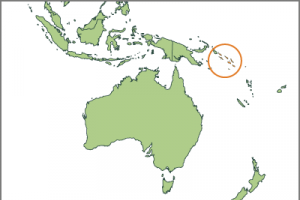When mining and logging companies come to villages asking for resource rights, how can communities make an informed decision without truly understanding all the impacts that these activities entail? Moira Dasipio, 55, lives and works in the Isabel Province of the Salomon Islands and is determined to give local populations access to more information about large-scale projects.
Solomon Islands
Other information
11 March 2015
Bulletin articles
18 August 2007
Logging operations of Omex Industry Limited in Boloboe land on Vella La Vella island, Western Province of the country, have long been a subject of disputes and legal battles. Over the weekend of the end of July a tragedy took place.
Bulletin articles
3 May 2004
Melanesia, which includes Papua New Guinea, Solomon Islands, Vanuatu, Kanaky (New Caledonia), Fiji, East Timor and West Papua (Indonesia), is unique in the world in that 95% of land is still under community ownership by the indigenous people. The forests they control are part of the largest remaining rainforest in the Asia Pacific region and the 3rd largest tropical forest on Earth after the Amazon and Congo. Illegal and destructive industrial logging is rampant, mainly by Malaysian companies who have moved from Sarawak and elsewhere in Asia as the forests were exhausted.
Bulletin articles
3 May 2003
Logging companies are being warned of people presenting documents to them which may appear to have tribal and provincial government approvals.
The warning came from former president of West Big NGela Area Council Ray Mano saying this attitude is widespread among NGela Logging Licence Holders.
He explains that this has surfaced recently when one or two people were conned into signing documents allowing tribal lands to be logged.
Mano explains that tribal lands in Solomon Islands are not owned by individuals but the tribe.
Other information
7 October 2002
Solomon Islands in the western Pacific have been ravaged by nearly three years of civil conflict. The economy is in tatters, the main city Honiara is run by militant groups, and most education, health and public service functions are not working. In this climate the corruption ridden, destructive and often illegal industrial logging sector has continued unabated.
Bulletin articles
11 September 2001
A new report on the social impacts of development on Solomon Islands’ communities has found village-based enterprises strengthen family and village life. The report, “Caught Between Two Worlds”, concluded that, in contrast, large-scale industrial enterprises such as logging and plantations often create tension, more work for women, and damages villagers’ way of life.
Bulletin articles
13 December 2000
The Solomon Islands have been devastated by Australian and Asian logging companies; which have swept through the country's forests, leaving a trail of disintegrating communities, flattened and degraded forests and silted coral reefs from runoff of exposed fragile soils.
Bulletin articles
18 May 2000
On a group of Melanesian islands in the South Pacific, a tragic plunder is taking place. Logging by mainly Malaysian companies has escalated in the last five years to more than 3 times the estimated sustainable yield. In other words the forests are being logged at more than three times faster than they are growing. In less than ten years all the productive lowland forests will be logged. The forests are rich tropical rainforests with thousands of unique plants and animals. As well, a diversity of cultures and people who customarily own and rely on the forests are under threat.
Bulletin articles
25 June 1999
The Solomon Islands, an archipelago of Melanesia in the South Pacific Ocean, are an independent state since 1978. The country's economy is based on agriculture, fisheries and forestry. Its territory has undergone a severe process of deforestation and consequent soil erosion in exposed areas. For example, in 1995 the government ordered the logging of all trees on Pavuvu island and their residents were relocated under protest. A relevant actor behind the scenes have been the forestry industry, concentrated in a few hands -mostly foreigners- and very influent over the national timber policy.


